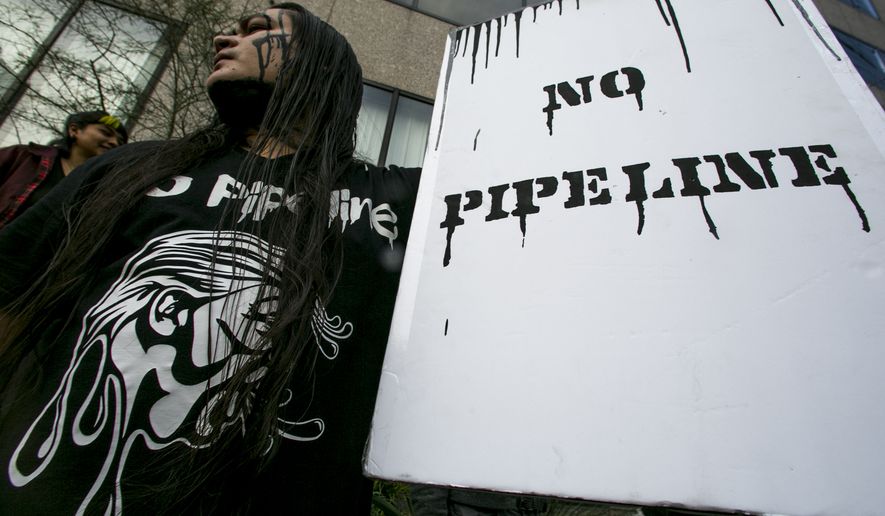A Dakota Access pipeline executive lashed out Wednesday at protesters who have wreaked havoc for months in their campaign to halt the project, comparing those who shut down pipeline operations to terrorists.
“Whether directly or not, the protest movement induced individuals to break into and shut down pump stations on four operational pipelines,” Joey Mahmoud, Energy Transfer Partners project executive for the pipeline, told a House Energy and Commerce Committee subcommittee.
“Had these actions been undertaken by foreign nations, they could only be described as acts of terrorism,” he said.
His submitted testimony before the energy subcommittee hearing on infrastructure came as the Dallas-based company’s most extensive comments to date on the protest uproar over the 1,172-mile, four-state pipeline, which is now 99 percent complete.
Mr. Mahmoud described a firm under siege as its employees were threatened and attacked, its facilities destroyed and vandalized at a cost of millions, and its commitment to “playing by the rules” undermined by the Obama administration’s political agenda.
“[W]hat is abundantly clear is that the Department of the Interior, and most likely senior members of the White House staff, interfered deeply and inappropriately in the waning stages of the regulatory process,” Mr. Mahmoud said, referring to decisions to delay and then pull a previously granted easement for the final segment of the project.
Harold Frazier, chairman of the Cheyenne River Sioux, took umbrage at the terrorism comparison. He said he was there at the Nov. 21 clash between hundreds of protesters and the Morton County Sheriff’s Department on the Backwater Bridge north of Cannon Ball, North Dakota.
“I’ve seen from the cops the shooting of rubber bullets, shooting tear gas canisters. I’ve seen them use water cannons on people when it was like 22 degrees,” Mr. Frazier said at a Wednesday press conference at the National Press Club. “And that went on for hours.”
“So I don’t know how he could say and label our people as terrorists,” Mr. Frazier said. “From what I’ve seen, Morton County are the terrorists.”
Morton County officials say they have used the least-lethal means possible against protesters who have in some cases thrown rocks, feces and Molotov cocktails at police and refused to disperse after trespassing on private property and blocking bridges and roads.
Mr. Mahmoud said the company’s employees have paid the price. Pipeline opponents have assaulted “numerous pipeline personnel, one of whom required hospitalization,” and issued death threats against several employees and their children.
Also testifying before the subcommittee was Standing Rock Sioux tribal council member Chad Harrison, who described the pipeline as an “opportunity lost,” insisting that for almost three years the federal government and Energy Transfer Partners “ignored the concerns of the tribe.”
“Consulting does not mean telling us what you are going to do and how you are going to do it. It means listening and making the necessary changes to ensure these projects do not harm our people, our lands and our resources,” Mr. Harrison said.
Mr. Mahmoud said his company and the U.S. Army Corps of Engineers went out of its way to reach out to tribes, consulting with 55 different Indian groups and rerouting the project 140 times, but that the Standing Rock Sioux rebuffed repeated efforts to engage in consultations.
“It was clear from their response they had no interest in discussing the project with us,” Mr. Mahmoud said.
The $3.8 billion pipeline is expected to be finished by May 1 after receiving a federal easement last week for the final 1,100-foot stretch under Lake Oahe. The Sioux tribes have filed lawsuits to stop the project, but suffered a setback Monday after a federal judge rejected a request for a temporary restraining order.
The pipeline project is built almost entirely on private land, and “does not cross a single inch of tribal reservation or trust land,” Mr. Mahmoud said.
In October, activists with Climate Direct Action were arrested after breaking into pipeline facilities in four states and disrupted operations. The activists later said they did so in solidarity with the Dakota Access protest.
Mr. Mahmoud warned that such protests have spread to other pipeline projects, fueled by a “well-organized and well-funded effort based primarily on hostility to fossil fuels.”
“Whether those being paid for their protest efforts share the agenda of those paying them is unknown, but what is known is many are now showing up in resistance to other pipeline projects,” Mr. Mahmoud said. “Far from being an exception, I fear the aggressive tactics we have seen in North Dakota will soon be the norm — if they are not already.”
• Valerie Richardson can be reached at vrichardson@washingtontimes.com.




Please read our comment policy before commenting.